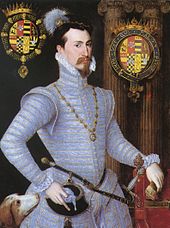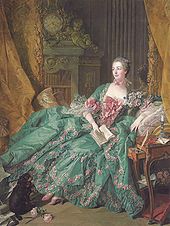- Courtier
-
A courtier (
 /ˈkɔːrtiə/; French: [kuʁtje]) is a person who is often in attendance at the court of a king or other royal personage.[1] Historically the court was the centre of government as well as the residence of the monarch, and social and political life were often completely mixed together. A female courtier was called a courtesan, although today this name has come to include sexual connotation.
/ˈkɔːrtiə/; French: [kuʁtje]) is a person who is often in attendance at the court of a king or other royal personage.[1] Historically the court was the centre of government as well as the residence of the monarch, and social and political life were often completely mixed together. A female courtier was called a courtesan, although today this name has come to include sexual connotation.Contents
Description
Monarchs very often expected the more important nobles to spend much of the year in attendance on them at court. Courtiers were not all noble, as they included clergy, soldiers, clerks, secretaries, and agents and middlemen of all sorts with regular business at court. Promotion to important positions could be very rapid at court, and for the ambitious there was no better place to be. As social divisions became more rigid, a divide, barely present in Antiquity or the Middle Ages, opened between menial servants and other classes at court, although Alexandre Bontemps, the head valet de chambre of Louis XIV was a late example of a "menial" who managed to establish his family in the nobility. The key commodities for a courtier were access and information, and a large court operated at many levels - many successful careers at court involved no direct contact with the monarch himself.
The largest and most famous European court was that of the Palace of Versailles at its peak, although the Forbidden City of Beijing was even larger and more isolated from national life. Very similar features marked the courts of all very large monarchies, whether in Delhi, Topkapı Palace in Istanbul, Ancient Rome, Byzantium, or the Caliphs of Baghdad or Cairo. However the European nobility generally had independent power and was less controlled by the monarch until roughly the 18th century, which gave European court life a more complex flavour.
In literature
In modern literature, courtiers are often depicted as insincere, skilled at flattery and intrigue, ambitious and lacking regard for the national interest. More positive representations of the stereotype might include the role played by the court in the development of politeness and the arts.[citation needed]
In modern English, the term is often used metaphorically for contemporary political favourites or hangers-on.
Examples of famous courtiers in fiction
- Rosencrantz and Guildenstern from William Shakespeare's Hamlet
Examples of famous British and French courtiers
- Anne Boleyn
- The princesse de Lamballe
- The duc de Luynes
- The marquis de Cinq-Mars
- The duc de Saint-Simon
- Madame de Pompadour
- Sir Walter Raleigh
See also
- The Book of the Courtier, by Baldassare Castiglione
- Courtesan
- Favourite
- Royal mistress
- Sycophant
- Courtly love
References
Categories:- Positions within the British Royal Household
- Political professionals
- Government occupations
- Court titles
Wikimedia Foundation. 2010.



